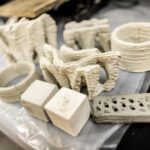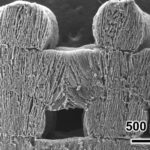Engineers at the University of Bath have developed a method using 3D-printed ceramic-infused lattices to remove harmful ‘forever chemicals’ from water. This innovative approach effectively eliminates at least 75% of perfluorooctanoic acid (PFOA) from water supplies. Published in The Chemical Engineering Journal, their findings highlight the potential for scalable, energy-efficient water treatment solutions.
Efficient and Scalable Solution
Dr. Liana Zoumpouli, a Research Associate at Bath’s Department of Chemical Engineering, explains that the use of 3D printing allows the creation of high-surface-area monoliths, crucial for the removal process. These 4cm monoliths, made from ceramic indium oxide ink, bond with PFAS, removing the chemicals from water in under three hours.

Legislation and Future Prospects
As health concerns over PFAS grow, more regulations are expected worldwide. Professor Davide Mattia notes the lack of strong regulation in the UK but anticipates policy changes soon. The team aims to refine their method to increase efficiency, with ongoing experiments showing promising results in repeated use.
Research and Development
The research team includes Dr. Alysson Martins, Dr. Antonio Jose Exposito, Dr. Jannis Wenk, and Prof Davide Mattia. Their work, funded by the Engineering and Physical Sciences Research Council, offers a promising solution to water contamination by PFAS.
For more information, visit the University of Bath website.










